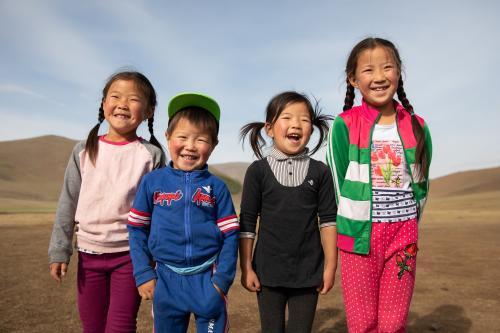South Africa has been a Pathfinding country since 2017, when the government made a formal, public commitment to ending violence against children. In 2019, the Ministry of Basic Education took the pledge one step further by endorsing the Safe to Learn Call to Action.
These commitments to protect children are vital in a country where one in three girls and one in five boys experience some form of violence. And, being both a Pathfinding country and a Safe to Learn endorser positioned the country to respond quickly to the risks brought on by the COVID-19 pandemic in 2020. In March, the Cabinet declared the COVID-19 pandemic a national disaster and the president announced a nationwide lockdown. Risks to children included child abuse, sexual violence, and domestic/interpersonal violence; lack of access to child protection and gender-based violence services, especially for children on the move or in rural areas; and psychosocial distress due to the death or illness of caregivers.
In response, the Minister of Social Development provided mechanisms for supporting children in institutions, custody arrangements and foster families. The main aim was to prevent family separation and create safe opportunities to support routine contact between children and family members who were physically separated. Lastly, health staff and traditional and religious leaders were trained to provide psychological first aid for children, parents and service providers.
The Ministry also sought to quickly understand how the pandemic was affecting children at higher risk of violence. UNICEF and Witts University equipped care workers with devices to capture and upload data in real time to a national dashboard on child wellbeing. The preliminary findings showed that 10 per cent of children reported child abuse, hunger, bad health or suicidal intentions. The data gave the Ministry timely insights into the support children needed so they could adjust their strategies. It plans to expand data collection and integrate it into a national digitized case management system.
In another area of child violence, the End Violence Fund in 2020 supported existing grantees and awarded new funds to help combat online child sexual abuse and exploitation as part of the Safe Online initiative.
Highlights include:
- UNICEF South Africa continued implementation of its Strengthening Children’s Online Safety in South Africa initiative in 2020, producing an online safety training manual for social workers, teachers, law enforcement, and children and their caregivers. UNICEF expects the manual to reach 1,000 frontline workers. Content was adapted into a virtual platform to make it more accessible during COVID-19 restrictions. UNICEF also created a toolkit with awareness-raising materials on online safety, including content for social media, podcasts, TV and radio. The content helped fuel a series of high-profile media events, including a televised national conference during Child Protection Week that drew up to 40 million viewers and featured speakers from the Ministry of Social Development, the private sector and children. Finally, UNICEF and its local partners used TikTok and studio recordings to reach young people and caregivers with tips on mental health wellbeing, counteracting stigmatization, and online bullying and attacks.
- The Disrupting Harm global research project made important strides in South Africa in 2020. UNICEF South Africa began collecting data using guidelines from UNICEF Innocenti research office. Following data collection, analysis will be carried out on a national level, complementing the analyses conducted by partners ECPAT and INTERPOL under their respective projects. This data will capture children’s self-reported experiences of online violence, sexual exploitation and abuse, placing children’s own voices at the heart of the research and enabling them to inform future solutions.
- A new initiative to improve the technology behind child helplines in South Africa was launched in 2020. Tech Matters, a grantee of the End Violence Fund’s Safe Online portfolio, aims to expand and extend an open-source cloud child helpline platform called Aselo. Tech Matters will create special features to help prevent online child sexual exploitation and abuse and make it possible for children and adults to report child sexual abuse materials directly from social media platforms. Tech Matters is working closely with Childline South Africa, a nonprofit organization with nine affiliates across South Africa.
Read more about the progress of Pathfinding Countries in our 2020 Annual Report.

